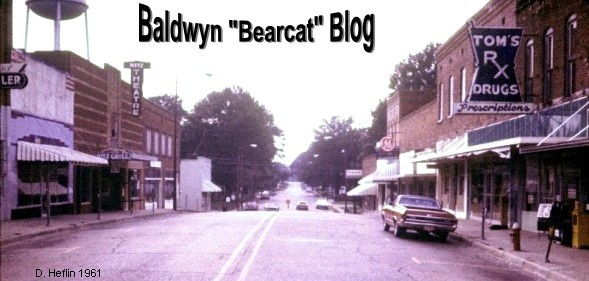


From the "Booneville Pleader" newspaper, 1882:
Dr. W.J. Rogers of Marietta sent a wire Tuesday. His message was in obedience to an invitation extended to our subscribers sometime ago and his response was prompt and agreeable. We learn from the doctor that the hotel at Marietta will be completed by the 15th of June, and
"ample accommodations will be made for all visitors who may wish to test the curative properties of the Purple Shell Mineral Springs."____________
The earliest buildings constructed in Baldwyn were a log store and log blacksmith shop. The first real frame house or building was a two-story building hauled by wagon in sections from Marietta and reassembled. Marietta buildings were sold and shipped to other locations when business declined at the springs.
Chief Tishomingo, a Chickasaw war chief during the "Red Stick War" against the Creeks, was a believer in the healing powers of the waters of the Marietta springs and the many others that were found near Baldwyn and scattered about the area east of town. He and other chiefs would soak away the pain and wounds of battle and drink the waters. A pow-wow was held in Iuka and Marietta yearly for the Chickasaw nation leaders to enjoy the springs and plan their strategies.
When the chief is said to have died in 1841, he was reportedly more than 100 years old, so maybe the water had a profound effect. The name "Tishomingo" was probably an American corruption of "tisho miko," which was a title (assistant chief) rather than a name.
Chief Tishomingo at one time lived in what is now the Bethany community, in the northwestern part of Lee County, but at the time of Tishomingo's residence that area was a part of Pontotoc County. There Tishomingo owned two sections of land.
His daughter, Tippah, was a beautiful princess and the County of that name is in honor of her.
______________
Miss Jessie Archer wrote a poem "Nemo-Akim" in the 1930s that was published in the high school annual and local newspapers of that time, among other places.
Submitted by Henry E. Outlaw:
NEMO-AKIM (THE PURPLE SHELL)
(This legend refers to one of the group of springs at Marietta, MS, which is supposed to contain the Nemo-Akim or Purple Shell of the Indians)
When the red man here was monarch, as the old-time legends tell,
Once he owned a priceless treasure, 'twas a shining purple shell,
And it held the power of healing, hid within its mystic hue,
He who touched its polished surface pain and sickness never knew.
Oft it healed the wounded warrior, with the foe before his face,
Oft refreshed the bleeding hunter, faint, returning from the chase,
Oft when burning, deadly fever smote the red man with its breath,
Purple shell, the Nemo-Akim, saved him from the sleep of death.
Far across the distant mountain, hunters came o'er rock and dell,
Many weary moons they wandered, just to touch the magic shell,
Long was it the red man's treasure, guarded with a jealous care,
Long was it the red man's blessing, Nemo-Akim bright and fair.
Autumn's painted leaves were burning, dancing, falling soft and still
When a spring was gurgling, rippling, in the sands beneath the hill;
When the mighty Chief Makonah, paused to rest him in the shade,
Gazing on the limpid waters where the gay leaves danced and played.
Then the bright-hued leaves in circles, flutter'd round the warrior's head,
"Let the great Makonah listen, he is thirsty now," they said:
"He must drink from Nemo-Akim, then his slumbers will be sweet,
And the leaves shall dance together, in the sunlight at his feet."
Then the chief, as in a vision, saw them dancing as they fell,
And he, in the laughing waters, idly dipped the purple shell.
But it slipped between his fingers, bright waves snatched it from his hand,
Then in vain, the mighty sachem, sought it in the shallow sand.
Then he came before his people, on his face in anguish fell,
"Woe my brothers, to Makonah, he has lost the purple shell.
Nemo-Akim! Oh my people, let the careless warrior die.
He has lost the red man 's treasure, never shall your tears be dry."
Then from every scattered wigwam, every lodge beside the rill,
Came the warrior and the maiden, to the spring beneath the hill;
Vainly searching, searching, searching, till the red man's heart was sore.
But no hunter, squaw, nor sachem, ever saw the treasure more.
In the sands where Nemo-Akim vanished from Makonah's sight,
Bubbled forth a fresher fountain, it was clear and pure and bright,
And it held the power of healing, still they came and found it true,
He who drank its limpid waters, pain or sickness never knew.
Long, oh! long ago has vanished of the red man's every trace,
From the hillside and the hollows, that were once his dwelling place,
Every token has departed, where his tribe were wont to meet,
And his ashes long have mingled, with the dust beneath our feet.
But that spring is gushing, rippling, in the sand beneath the hill,
Where concealed from white man's vision, Nemo-Akim lieth still;
Still its healing balm distilling, thro the bubbles as they rise,
From the heart of Nemo-Akim that in viewless splendor lies.
Still when autumn paints the forest, with her tints of red and gold,
Bright leaves dance again in circles, gaily as they did of old;
Holding every breeze enchanted, while they keep their mystic spell-
Thus they hold their yearly revels, o're the spring of purple shell.
And 'tis said the red man's spirit, to this fountain as of yore'
When the midnight moon is beaming, brings his earthen cup once more,
Quaffs again the healing waters, that are gushing, rippling still,
O're the long lost Nemo-Akim in the sands beneath the hill.
- Miss Jessie Archer, Baldwyn, MS




































